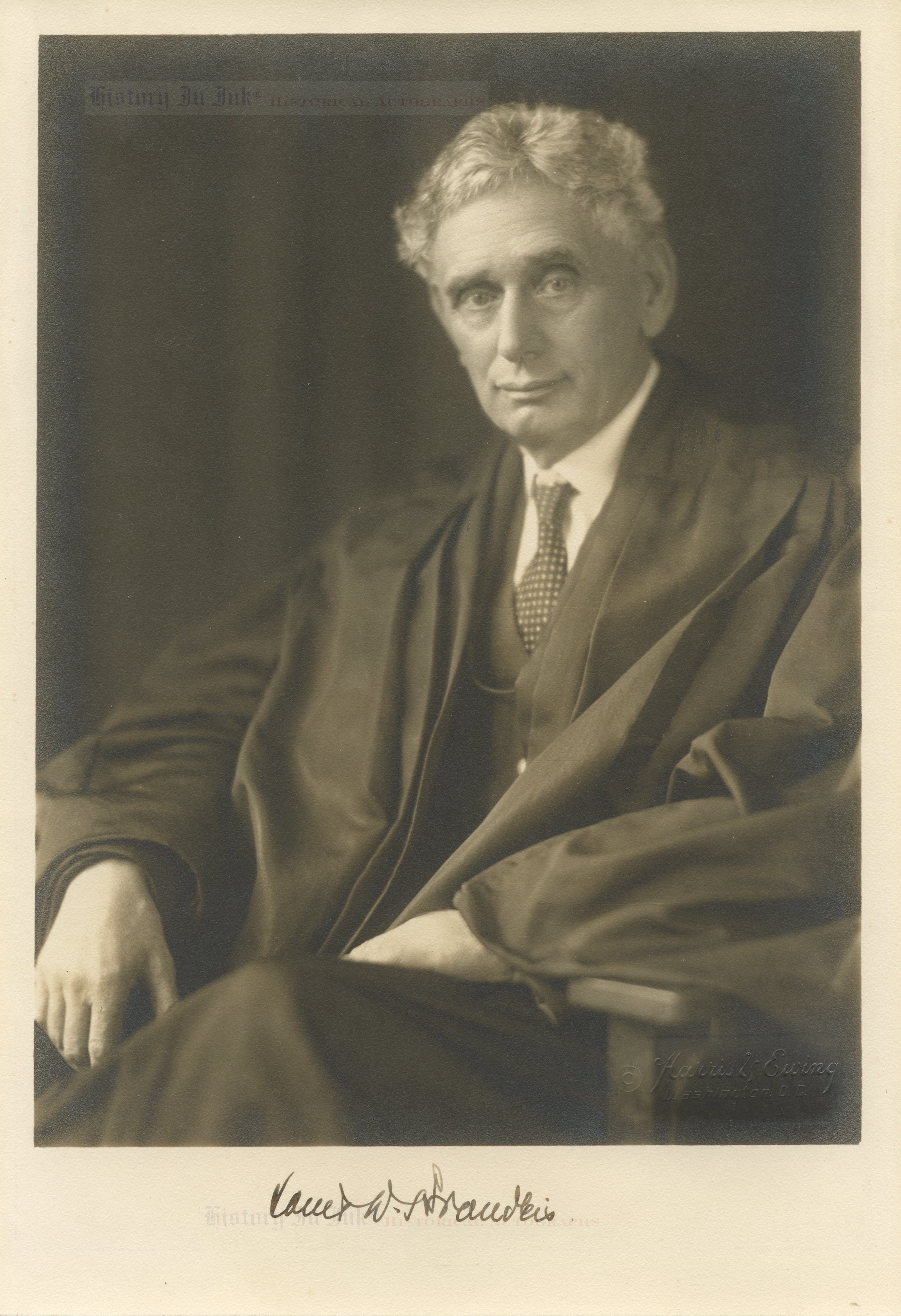
1616001
Louis D. Brandeis
Magnificent signed portrait of Justice Brandeis in his robe
Louis Dembitz Brandeis, 1856–1941. Associate Justice, United States Supreme Court, 1916–1939. 7⅛" x 10⅜" black-and-white photograph signed Louis D. Brandeis.
This is a beautiful portrait of Justice Brandeis in his robe. It is by Harris & Ewing of Washington, D.C., whose blind-embossed stamp appears at the lower right of the image. Brandeis has signed in black fountain pen in the oversized white margin beneath his image.
The son of Jewish immigrants, Brandeis was born and raised in Louisville, Kentucky. He went to Germany to complete his secondary education but returned to the United States to enter Harvard Law School at age 19. He graduated in 1877 with the highest grade average in the law school's history.
Brandeis began practicing law in St. Louis, but within a year he returned to Boston to practice with his classmate Samuel Warren. He developed outstanding credentials as a lawyer. A reformer interested in freeing government from corruption and in making democratic government a reality, Brandeis saw the law as a tool to shape social, economic, and political affairs. Accordingly, he spent much of his time pursuing cases with a political bent. He represented the public interest in a number of controversial cases, often without pay.
Brandeis was also an ardent Zionist. He became active in Zionist affairs during World War I, chairing the Provisional Executive Committee for General Zionist Affairs. Brandeis had a major impact on the American branch of the Zionist movement.
In 1916, President Woodrow Wilson made Brandeis his second Supreme Court appointment. Despite Brandeis’s considerable abilities, the appointment was very controversial. A five-man subcommittee of the Senate Judiciary Committee heard testimony concerning his "fitness" to serve. Former President William Howard Taft and six former presidents of the American Bar Association signed a letter urging rejection of the nomination on ground that Brandeis was unfit. The president of Harvard and other Boston Brahmins also wrote to urge rejection of the nomination. The subcommittee split 3–2, along party lines, to approve the nomination. Ultimately, after substantial politicking by the Wilson Administration, the Judiciary Committee sent the to the full Senate by another party-line vote, 10–8. The Senate confirmed Brandeis 47–22.
As a Justice, Brandeis remained a reformer, favoring small government and state experimentation. His constitutional outlook was progressive, anti-monopolist, and anti-big business. He mastered procedural details, researched the facts and the law, and went to great lengths to fashion opinions that were clear and logical. Although no longer an official of the Zionist movement, he worked behind the scenes to influence President Wilson to support the Zionist cause, led a delegation of American Zionists to a conference in London, and later appealed to President Franklin D. Roosevelt to oppose the British plan to partition Palestine in 1937.
The matte-finish photograph has a bit of silvering around the dark edges of the image and a few trivial foxing spots in the white margin that are hardly noticeable with the naked eye. There are mounting remnants on the back from prior mounting in an album and prior framing, but they do not affect the magnificent image and bold signature. Overall the piece is in fine condition, and were it not for the mounting remnants on the back we would grade it very fine. It would be stunning if it were reframed.
Unframed.
_____________
This item has been sold.
Click here to see other Supreme Court items
that we are offering.



